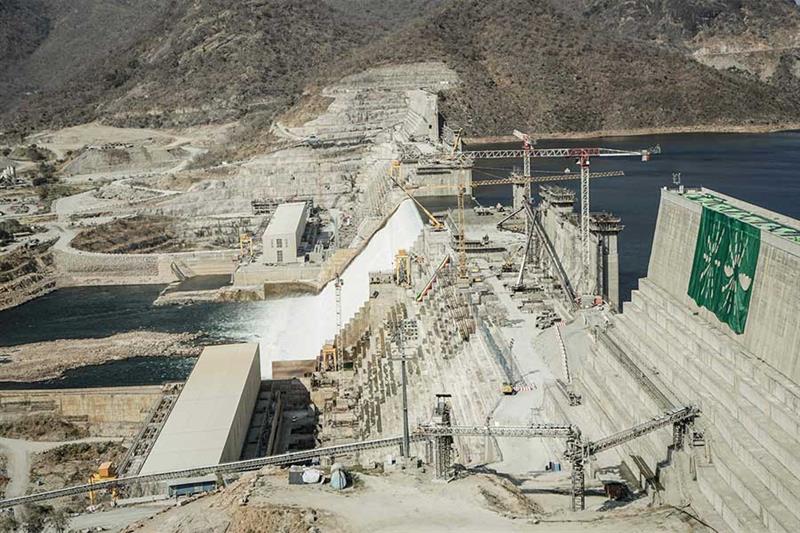

An Ethiopian national flag is seen at the Grand Ethiopian Renaissance Dam (GERD) in Guba, Ethiopia. AFP

“Egypt adheres to restraint and considers the rights of the Ethiopian people to development, but this matter has not and will never be in lieu of the right of the Egyptian people to life and existence,” Shoukry pointed out.
Cairo and Khartoum have been negotiating with Addis Ababa for almost a decade now to reach a legally binding deal on the GERD, which Addis Ababa started building on the Blue Nile in 2010.
However, Ethiopia unilaterally completed three phases of filling the GERD, and announced in February last year that the first turbine of the dam has begun generating power.
The latest round of GERD negotiations collapsed in April 2021 in Kinshasa; all attempts to revive the talks since then have failed.
Egypt, which relies mainly on the Nile for its water needs, fears that the unilateral and quick filling and operation of the GERD will have a negative impact on the country’s water supply. Meanwhile, Sudan is concerned about regulating water flows to its own dams.
Shoukry said the Middle East and Africa face “serious” water security challenge, adding that some of these countries are situated in the driest and most deserted regions of the world.
This challenge, the foreign minister added, is coupled with the desire of some upstream countries to control water resources without regard for the capabilities of other riparian countries.
Shoukry referred to what he called as “Ethiopia’s stalling” in reaching a binding legal framework for filling and operating the GERD.
Egypt – one of the most water-scarce countries in the world – receives around 60 billion cubic metres (BCM) annually – mainly from the Nile.
It needs around 114 bcm annually, a matter that places the over 100-million-person country well below the international threshold for water scarcity, at 560 cubic metres per person annually.
Shoukry made the comments while speaking at the annual conference of the Egyptian Council for Foreign Affairs (ECFA), which kicked off on Saturday and aims to tackle the repercussions of Russian-Ukrainian crisis on the Middle East and Egypt.
According to a statement released by Foreign Ministry Spokesman Ahmed Abu Zeid, Shoukry expressed during the event his appreciation for the success of the Egyptian diplomatic bodies, referring to the crises and challenges witnessed in 2022, including the Russian-Ukrainian crisis.
The minister reviewed the country’s “strenuous” efforts to act at the bilateral and multilateral levels to contain the negative economic repercussions of the war crisis on the Egyptian economy, Abu Zeid said.
Shoukry reiterated the importance of maintaining the concept of national state, tackling the most challenges besetting the regional neighboring countries, including Libya, Sudan and Palestine.
He also shed light on the challenges of climate change, including its repercussions at the humanitarian, economic and social levels, Abu Zeid said.
Short link:






GIPHY App Key not set. Please check settings